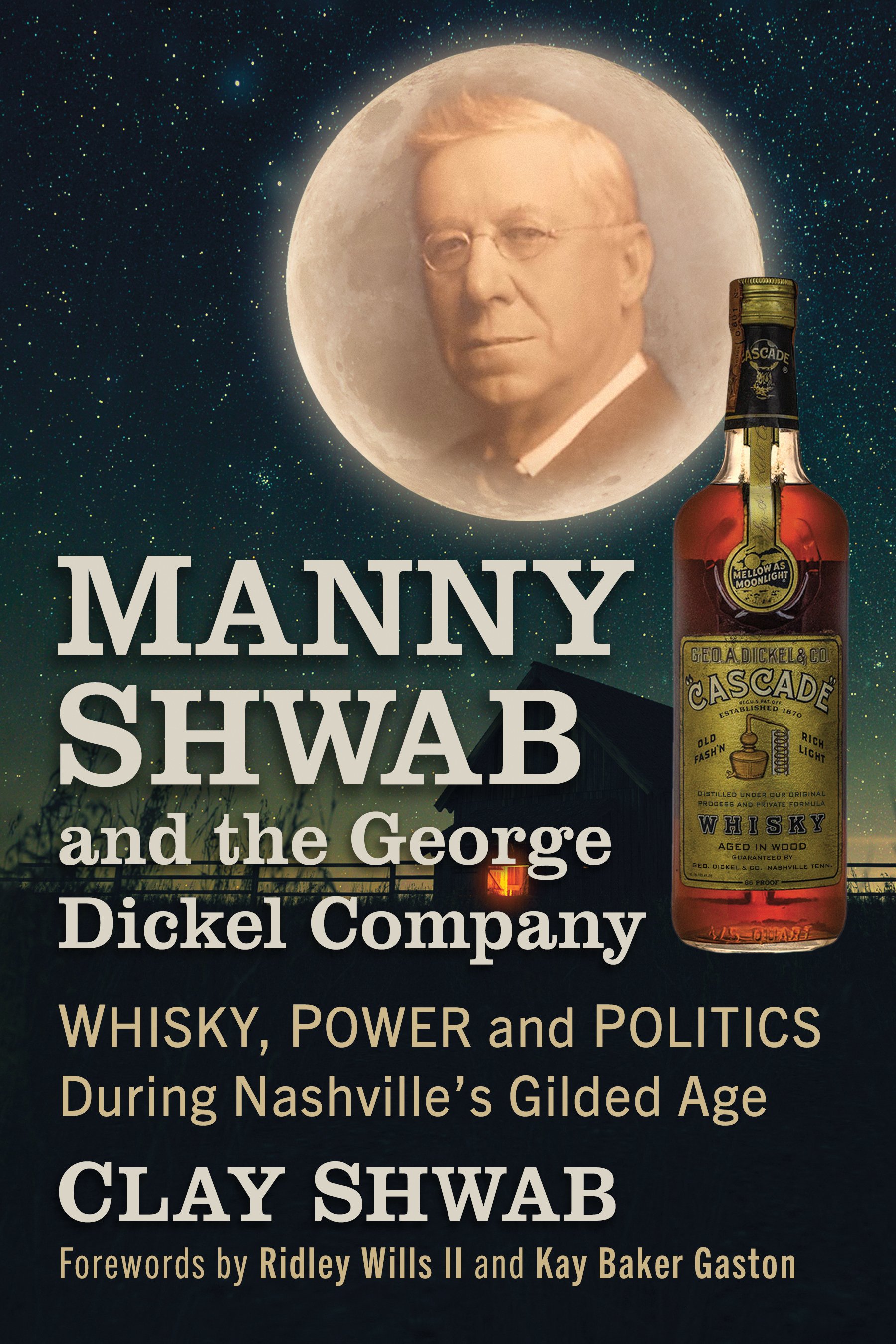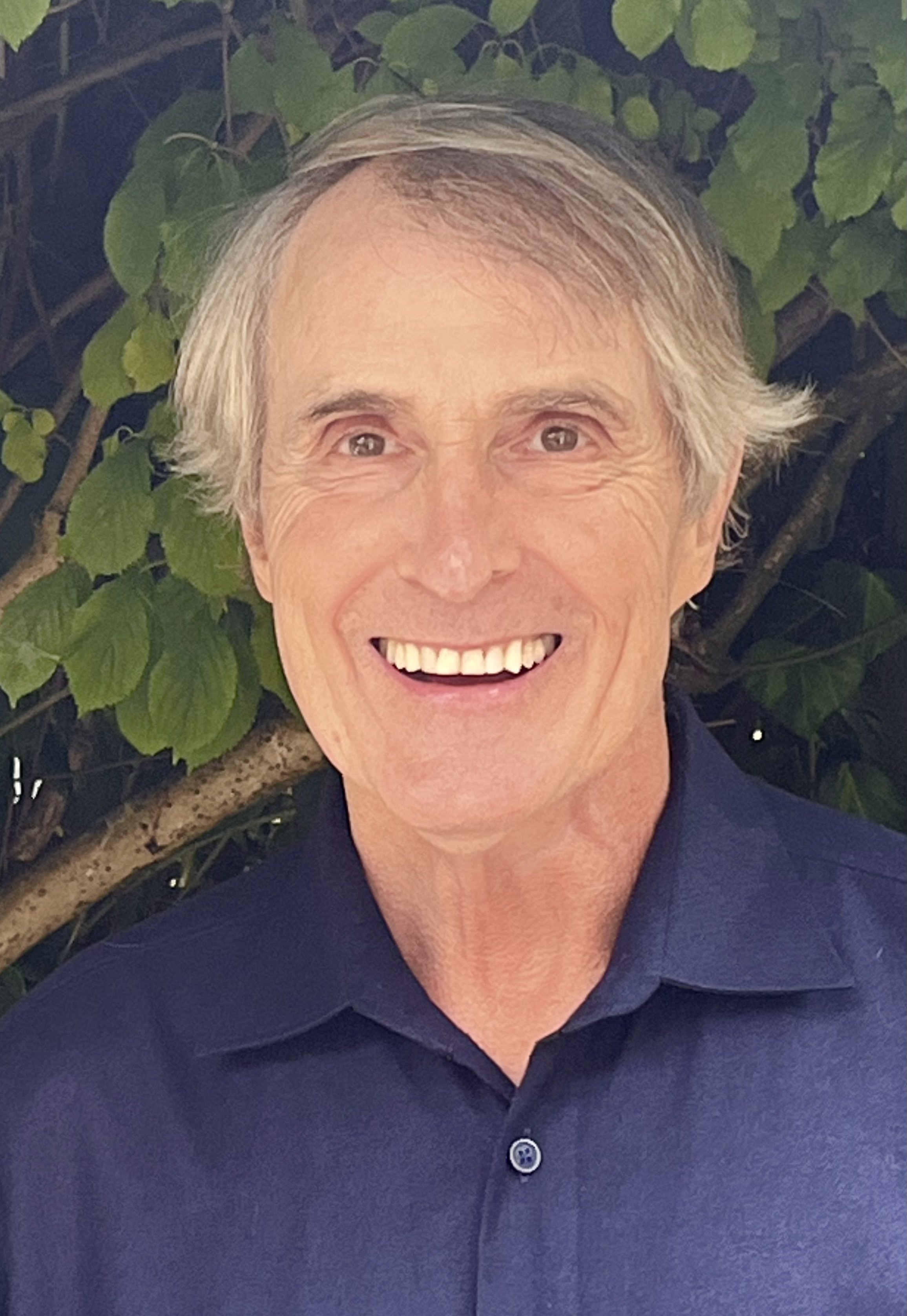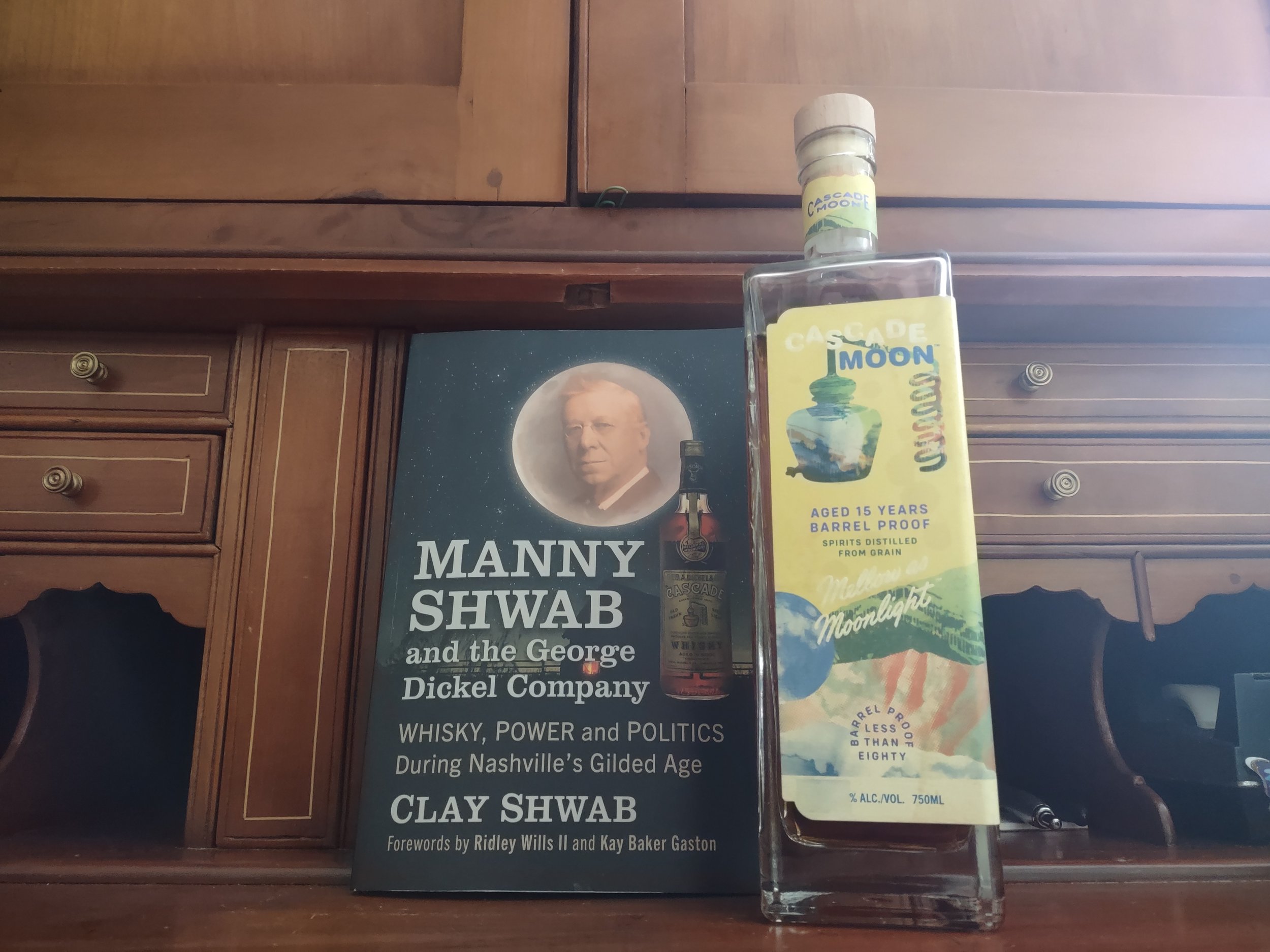Boozy Book Review: Manny Shwab And The George Dickel Company
Manny Shwab and The George Dickel Company
Back in 2020, I was invited by a former university professor of mine to give a talk at his congregation’s virtual Havdalah service about the Jewish influence in American Whiskey and Kosher cocktails. In Louisville, that’s a pretty easy task because we have the history of people like Isaac Wolfe Bernheim, the Shapira brothers, Henry Kraver and many more. But there was a Rabbi from a Tennessee congregation in attendance who asked me to give the same talk to his congregation but to also include Jewish people in the distilling industry from Tennessee and Kosher whiskey. After posting on Facebook asking colleagues for any information, Chuck Cowdery told me about Manny Schwab, George Dickel’s business partner.
At the time, I could not find much information about him, so he was just a footnote in the talk. So when I learned that his great-grandson, Clay Shwab, had written a biography about him, I reached out to get a copy for review. Manny Shwab and The George Dickel Company: Whisky, Power, and Politics During Nashville’s Gilded Age soon arrived in my mailbox.
This book is more about the life and times of Victor Emmanuel “Manny” Shwab and his family and business associates than it is about the whisky, though there’s a lot of historical context regarding the brand’s creation and struggles. Prohibition was the law of the land in the Confederacy, and several of the states in the South, including Tennessee, were constantly on the verge of becoming totally dry, which Tennessee did around the turn of the century. Running a Tennessee distillery was a continual challenge, and Manny Shwab did everything from allegedly bribing elected officials to allegedly dodging taxes to keep the business going.
In this book there are prostitutes, murderers, and lots of people with syphilis. Each page is another snapshot of the historical circumstances surrounding the George Dickel brand. There’s even a mention of someone in there who is probably one of my ancestors, John Fitch, though not the same one who invented the steamboat and is buried in Bardstown — another mystery for me to unravel in my free time. There’s civil asset forfeiture, in which the United States government charged barrels of whisky with a crime, and even the seizure of the entire Cascade Hollow Distillery by the Federal Government at one point. One of Manny’s daughters becomes a famous concert pianist. There’s a lot going on with the Shwab family.
Some interesting historical tidbits that warrant additional research include the unfinished square boxes that the Dickel brand used to take its whisky to market as well as the notion that there was once a certification for the sour mash process. Fortunately, this book has excellent footnotes and a thorough index, so finding the source of that information should be simple enough.
Manny’s father, Abraham, came to the United States and became a wine and spirits importer, and at one time even imported the newest European craze, sparkling water. It’s easy to see where Manny would get the idea to first become a nondistiller producer and then to actually manufacture spirits in Tennessee. He partnered with George Dickel, a German immigrant and shoemaker, to create the Cascade Distillery. Shwab seemed to be a master at marketing, coining the phrase “mellowed by moonlight” to depict the fact that the mash was cooled at night.
As the tides turned toward Prohibition in Tennessee, the Shwabs contracted with the A. Ph. Stitzel Distillery in Louisville to continue production until wartime Prohibition and eventually nationwide Prohibition took over. After Prohibition was repealed, the Shwab family made the decision to sell the brand and distillery grounds.
Sadly, just days after Manny Shwab died, the Cascade Distillery burned to the ground in a forest fire. He was buried in a plot he had purchased a few years earlier where he had buried his friend and business partner, George Dickel.
The story of George Dickel usually centers around Dickel, but Shwab was behind the success of the brand and in fact owned two-thirds of the distillery they founded together. But it’s almost impossible to separate the Dickel and Shwab families because they did so much together in life as well as in business. Jack Daniel’s gets the most attention when it comes to Tennessee whisky, but George Dickel’s Cascade Whisky was once the powerhouse of Tennessee Whisky.
After reading, I caught up with author Clay Shwab to learn more about the book.
What made you realize that this was a story you needed to tell?
Clay Shwab
There were two “inspirations” for writing this. The first was a blog written years ago by Chuck Cowdery that my son pointed out to me. Chuck was bemoaning that more distilleries weren’t promulgating the whole and true, often fascinating, histories of the companies. He stated that, for instance, the Dickel company had created a “Keebler Elf” image of George Dickel, and “surely there are some Shwabs” out there who would want to correct the record. That got my attention. As I knew nothing of the story, I began, erratically, researching the company and came upon an article in the Tennessee Historical Quarterly by Kay Gaston which contained quite a bit of information, some about V. E. “Manny” Shwab, my great grandfather. That motivated me to get more serious about the research. I was surprised to learn about the very significant, international reputation of Cascade Whisky (“mellow as moonlight) and the George A. Dickel Company as well as the impact Manny had on post war Nashville. Then I met Ridley Wills. Ridley has written over 30 in depth books on Nashville. I told him what I was learning about Cascade Whisky, George Dickel, and Shwab. He became animated and insistent that “this is a story that has to be told—no one knows these stories!” That made me think that what I was uncovering might be useful information to people interested in Tennessee whiskey history, the contentious, wildly divisive prohibition battles, and life in the South after the Civil War. Also, the editor of the Tennessee Historical Quarterly said that “what you’ve outline here is a real gap in the literature that your book is going to fill.” After that, I had to complete it.
Did you find any surprises in your research?
Manny Shwab and The George Dickel Company and Cascade Moon
There were many. The outsized significance, internationally, of Cascade Whisky for one. For instance, in the four years 1905-1908, Cascade paid, in today’s dollars, $34 million in taxes—25% of taxes paid by all middle and west Tennessee distilleries combined. When the feds seized the distillery, it was the largest federal seizure of any kind in American history. It is telling that Pappy Van Winkle is quoted as saying about “the great Cascade” that “its like has not been seen since Prohibition.” Another surprise was Manny’s influence throughout Tennessee for four decades. He was called a one man Tammany hall, “owner of Tennessee politics,” “debaucherer of more young men in the state” (because of his Dickel company and many saloons–“sporting houses”). His obituary declared him the wealthiest man in Nashville and one of the wealthiest in the South.
I begin the book with Manny’s father, Abraham Shwab, and his Shwab & Co–fine imported wines, whiskies, and brandies–because he was the spark for the George Dickel Company. I don’t believe that is in the record. His Alsatian connections were necessary for his stores in Knoxville, Nashville, Youngstown, and Louisville, and his sons, Manny and Emile, and son-in-law, Meier Salzkotter (co-founder of the Dickel company) apprenticed with Abraham. After their successful Civil War smuggling operations, they provided the capital, connections, and experience necessary to launch the firm with George.
It was also surprising to me how very close the Dickel and Shwab families were. George and Manny married sisters and lived on the same property for thirty years. The Dickels had no children, but two of the Shwab children were named after them. After George’s death, “Auntie” lived with the family until her death. They are all buried in the same Nashville Mt Olivet plot.
Is there any family lore that didn’t make it into the book?
I have already pissed off several family members with some of the included lore. I best let the rest lie in peace.
Why do you think Manny Shwab doesn’t get the same recognition as George Dickel?
That’s a really interesting question. Even with all his political notoriety and business ventures (three railroads, three banks, Cascade and Dickel, saloons, electric company, telephone company, etc), after reading well over a hundred newspaper articles mentioning him, I did not come across one interview or a direct quote. He was always in the background, obviously avoiding the limelight. But his impact on Tennessee and its whiskey is huge. I hope this book drags him out of the shadows.
What do you think is the biggest contribution Manny Shwab made to Tennessee whisky?
I believe, more than any other single person, he put Tennessee whiskey, literally and figuratively, on the map. His insistence on the highest quality whisky possible and the use of the D’Arcy Advertising agency (whose one other major client was Coca Cola) dramatically elevated the status and reach of Tennessee whiskey. The ads throughout the country and Canada are amazingly creative. It says a lot that years after the closing the distillery due to prohibition, when it burned to the ground, newspapers throughout the country and Canada ran articles about “the great Cascade Whisky” stating it was the “largest firm of its type”. Through his, sometimes edgy, efforts, Prohibition in Tennessee was put off for at least ten years.



